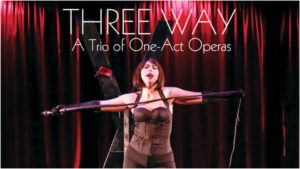
CD Review: Paterson and Cote’s ‘Three Way’ Not Your Usual Sex Opera
By Santosh VenkataramanIs it possible to create something risqué yet non-controversial at the same time? Something that tackles sexually-charged topics such as the LGBTQ community, dominatrices, couple swapping and the role of artificial intelligence in relationships? Can all of this be depicted in a way that isn’t preachy or pejorative in these polarizing times?
Nobody probably asked themselves these questions but if anyone did, they have an answer in what composer Robert Paterson and librettist David Cote created in their three-act chamber opera “Three Way.” It had its world premiere at the Nashville Opera in January under the baton of Dean Williamson and was also seen in June at the Brooklyn Academy of Music through American Opera Projects. Paterson and Cote’s collaboration was released last month in a CD of the original cast recording by American Modern Recordings.
Just Enjoy!
This thoroughly accessible and enjoyable work that features eight quality singers and a 12-person orchestra is first of all, plenty of fun. That’s not a word generally associated with opera but it’s entirely appropriate here because Cote’s clever (maybe too clever?) writing and Paterson’s lyrical melodies make it simple to listen to and partake in some jaunty yet not raunchy gags.
That’s not to say that this is easy listening; that’s far from the case. There’s a lot being said in this work in which each act features a unique story: “The Companion” is an unusual love triangle in which a woman has an android lover, “Safe Word” features a dominatrix and her client, and “Masquerade” offers a more modern take on, shall we say, couple swapping. Yet Paterson and Cote are having fun with these situations and not taking the salacious content too seriously.
Homage At Its Best
Opera fans will note that “Three Way” is simultaneously an homage and a send-up of the opera world. That’s because of the operatic background of the creators, with the team creating 12 distinct arias that superbly service the singers – a trait that can be lacking in new operas. Each act also connects to familiar masterpieces, with “The Companion” a nod to the Olympia act of Offenbach’s “Tales of Hoffmann.” The names Tosca and Salome prominently featured in “Safe Word” and Mozart’s “Così fan tutte” in “Masquerade.”
“Three Way” is ideal for new audiences because each act can be judged separately and distinctly. If the opera world is looking for ideas to bring the art forward, such techniques should be championed with audiences unwilling to engage in longer operas. It’s nice that such enterprise is being seen in programs like Washington National Opera’s American Opera Initiative of 20-minute works by current composers. So full credit goes to Nashville Opera for taking on “Three Way” as a premiere.
Lots to Chew on For Listeners
So what to say about each act?
I found “The Companion” to be the funniest and most shrewd of these tales. It featured soprano Danielle Pastin as Maya, who hires an android husband in Joe – tenor Samuel Levine. Joe is malfunctioning so tech support man Dax, portrayed by baritone Wes Mason, comes in to, ahem, fix matters? Opera lovers will indulge in Levine’s aria “You Were My First Love” while the other two excelled in the duet that followed in this witty piece about the age-old dilemma of finding a mate.
“Safe Word” has mezzo-soprano Eliza Bonet as a dominatrix and bass-baritone Matthew Trevino as her client, although things may not be quite what they seem. Again, the creators have something to say about this while not exactly making a statement.
“Masquerade” has a total of eight characters that include the aforementioned five singers along with soprano Courtney Ruckman, mezzo-soprano Melisa Bonetti, and countertenor Jordan Rutter in this story of a mysterious party hosted by the DeBridges, played by Bonet and Trevino. I enjoyed this one the most from a musical standpoint, with Rutter’s aria of “Why So Shy?” a particular highlight in this exploration of the vagaries of sexuality. The expressive music and doubts and misgivings of characters also made me think of Sondheim’s “A Little Night Music” regarding couples’ insecurities.
Where to Next?
Plenty of ambiguity is the major takeaway from “Three Way,” and isn’t that really the most truthful and refreshing way to look at sex in this modern era? My only complaint is that listening to the CD is no substitute for the missing visuals that no doubt made “Three Way” the complete operatic experience it was in the runs in Nashville and New York that I missed. Hopefully, that will be rectified since this is a work that deserves to be staged elsewhere and proves that opera done correctly can be as relatable as anything on television or at the multiplex.


